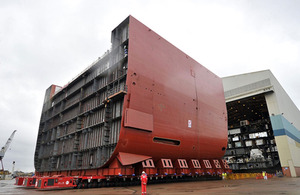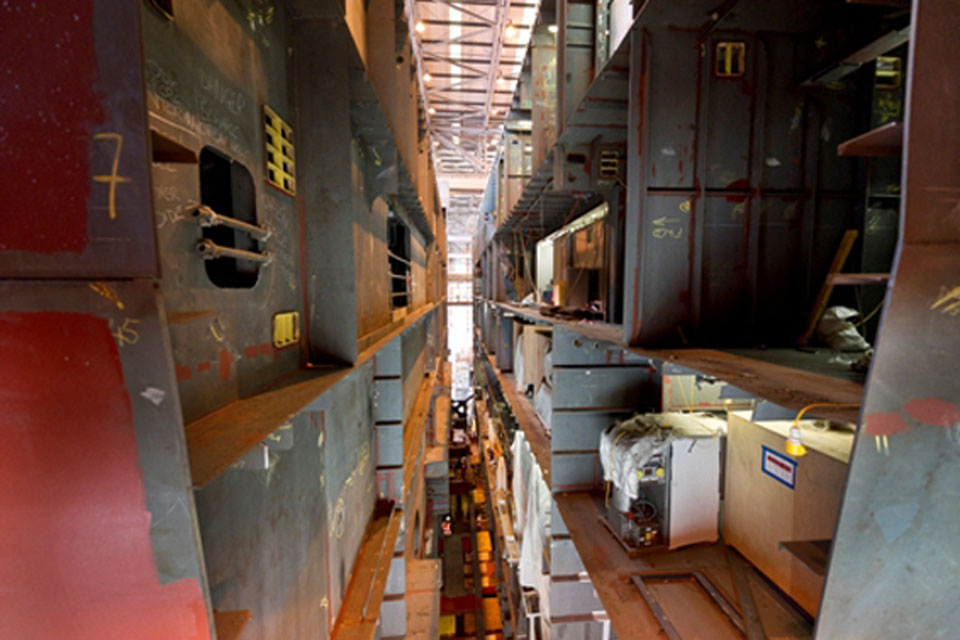Huge sections of new Navy carrier joined together
One of the two biggest warships ever built for the Royal Navy has taken another step towards completion with the joining of two huge sections.

Aft-section block LB04 of future Royal Navy carrier Queen Elizabeth on the move in Govan yard [Picture: Aircraft Carrier Alliance]
In a two-hour operation this past weekend, one section was moved from a large ship hall at BAE Systems’ Govan yard, on the Clyde at Glasgow, to join the other part of Lower Block 04, built in a neighbouring hall just 100 metres away.
Block 04 is home to the two main engine rooms, the sick bay and quarters for some of the 1,500 sailors and air group personnel who will serve on the ship.
Together the two sections comprise one fifth of Queen Elizabeth, the first of two 65,000-tonne super-carriers being built for the fleet.
This weekend’s operation involved 132 remote-controlled transporters moving 4,000 tonnes of steel.
The transporters moved the two parts to within five centimetres of each other. Workers will spend the coming few days closing the gap, precisely aligning the various units and compartments before welding the sections together.
Once fully fitted out, the completed block will weigh 11,000 tonnes and form the aft section of the carrier. It is the largest section of the ship, at 86 metres long, 40 metres wide and 23 metres tall - so large that it juts out of the ship hall.

Queen Elizabeth carrier sections come together [Picture: Aircraft Carrier Alliance]
Steven Carroll, Queen Elizabeth Class Project Director at BAE Systems, said:
Bringing together Lower Block 04 marks the beginning of an exciting stage in the block’s life. Once the link up is complete, the team will shift their focus back to the outfitting of the block, including installing 12,000 pipes and 100,000 kilometres of cables, ahead of her departure to Rosyth later this year.
That departure is due in the autumn; this block will be the last hull section of Queen Elizabeth to arrive on the Forth and will join the other units and sections of the ship in dry dock where she is being assembled.
At Govan, work also continues on the mid-section of the second ship, Prince of Wales. Since the first steel was cut on this section in May last year, over 80 units of LB03 are currently in production.
Half a dozen yards around the UK are involved in the carrier project, with some 10,000 people directly or indirectly involved in building sections, parts or providing equipment for what will be the largest ships ever built for Britain’s Navy.
At BAE’s sister yard in Portsmouth, the final work is being carried out on Lower Blocks 05 and 02 for Queen Elizabeth.
Block 05 leaves for Rosyth the end of the month, 02 in May - but before they leave the construction shed and are lowered on to a barge, they have to be weighed.
Carefully-positioned hydraulic jacks and sensitive load cells convert force into an electrical signal which in turn is translated into an accurate measurement of the block’s weight.
Paul Bowsher of the Aircraft Carrier Alliance, the combined BAE-Thales-Babcock and MOD Defence Equipment and Support team working on the huge project, said:
Getting the weight and centre of gravity right is really important when it comes to arranging for sections to be safely lifted - or moved by barge. We weigh each section at least three times to make sure the readings are accurate.